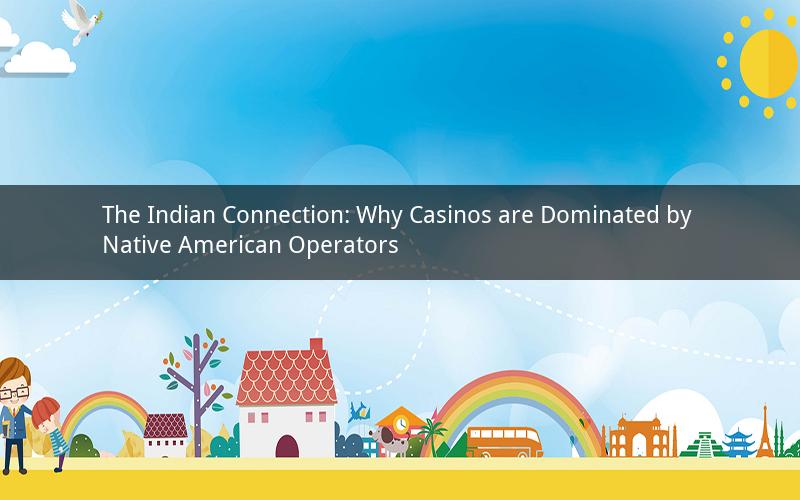
In recent years, Native American tribes have taken a prominent role in the casino industry, with many of the largest and most successful casinos being operated by indigenous communities. This phenomenon has sparked a great deal of curiosity and debate, leading to the question: Why are casinos run by Indians? This article explores the reasons behind this trend, examining the historical, economic, and cultural factors that have contributed to the Indian dominance in the casino industry.
1. Historical Context
The history of Native American tribes in the United States is one of struggle and resilience. Throughout the centuries, these communities have faced numerous challenges, including forced relocation, assimilation policies, and the loss of land and resources. In the late 20th century, the Indian Gaming Regulatory Act (IGRA) of 1988 provided a glimmer of hope for many tribes, allowing them to operate casinos on their reservations.
The IGRA was a significant legislative victory for Native American tribes, as it gave them the opportunity to generate revenue and improve their communities. This newfound economic power has allowed tribes to invest in education, healthcare, and infrastructure, while also providing employment opportunities for tribal members.
2. Economic Benefits
One of the primary reasons why casinos are run by Indians is the economic benefits they bring to tribal communities. Casinos generate substantial revenue, which can be used to fund various programs and services. For example, the Navajo Nation's Twin Arrows Navajo Casino Resort has generated millions of dollars in revenue, which has been used to improve healthcare, education, and infrastructure in the region.
The economic impact of casinos on Native American communities cannot be overstated. Many tribes have used casino revenue to create jobs, reduce poverty, and improve the overall quality of life for their members. In some cases, casinos have even helped to revitalize entire communities, fostering a sense of pride and unity among tribal members.
3. Cultural Significance
Casino operations also hold significant cultural value for many Native American tribes. Casinos often serve as a means to preserve and promote indigenous culture, history, and traditions. For example, the Mohegan Sun Casino in Connecticut features a museum that showcases the rich history and culture of the Mohegan tribe.
By operating casinos, Native American tribes can share their stories and traditions with the wider world. This cultural exchange not only fosters a greater understanding of indigenous peoples but also helps to preserve their heritage for future generations.
4. Legal and Political Power
The Indian Gaming Regulatory Act has granted Native American tribes a unique legal and political power. As sovereign nations, tribes have the authority to regulate and operate casinos on their reservations. This autonomy allows tribes to create their own gaming laws and regulations, ensuring that their interests are protected.
Furthermore, the success of casinos has given Native American tribes a voice in the political arena. As influential stakeholders, tribes have been able to advocate for policies that benefit their communities and promote the rights of indigenous peoples.
5. Collaboration and Partnerships
Many Native American tribes have formed successful partnerships with private companies to operate their casinos. These collaborations have allowed tribes to leverage the expertise and resources of experienced casino operators, while still maintaining control over their operations.
The benefits of these partnerships are twofold: tribes gain access to the necessary capital and expertise to run successful casinos, while private companies benefit from the unique cultural and historical appeal of Native American casinos.
Frequently Asked Questions
1. What is the Indian Gaming Regulatory Act (IGRA)?
The IGRA is a federal law that regulates gaming on Native American reservations. It was enacted in 1988 and has since been amended several times to address various issues related to gaming on tribal lands.
2. How have casinos impacted Native American communities?
Casinos have had a profound impact on Native American communities, providing economic opportunities, improving infrastructure, and fostering a sense of pride and unity among tribal members.
3. Can tribes operate casinos anywhere on their reservations?
No, tribes can only operate casinos on land that is considered "Indian country," which includes land held in trust by the federal government for a tribe's benefit.
4. How do casinos contribute to the preservation of Native American culture?
Casinos often serve as a platform for tribes to promote their culture, history, and traditions. This can include the creation of cultural centers, educational programs, and the employment of tribal members in various roles.
5. What are the challenges faced by Native American tribes in the casino industry?
Native American tribes face several challenges in the casino industry, including competition from non-tribal casinos, legal and regulatory hurdles, and the need to balance economic development with cultural preservation.